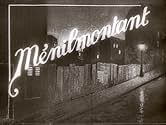Ménilmontant
- 1926
- 38min
CALIFICACIÓN DE IMDb
7.8/10
2.9 k
TU CALIFICACIÓN
Agrega una trama en tu idiomaA couple is brutally murdered in the working-class district of Paris. Later on, the narrative follows the lives of their two daughters, both in love with a Parisian thug and leading them to ... Leer todoA couple is brutally murdered in the working-class district of Paris. Later on, the narrative follows the lives of their two daughters, both in love with a Parisian thug and leading them to separate ways.A couple is brutally murdered in the working-class district of Paris. Later on, the narrative follows the lives of their two daughters, both in love with a Parisian thug and leading them to separate ways.
- Dirección
- Guionista
- Elenco
- Dirección
- Guionista
- Todo el elenco y el equipo
- Producción, taquilla y más en IMDbPro
Opiniones destacadas
10sandover
Poverty, disillusion, and yet grace graces the screen when Nadia Sibirskaya nods to the old man who offers her some food to chew. That scene, that means her social grace, brought me tears and elated me at once - miracles, oh yes, do and do happen and move.
One should note that the old man does not reciprocate, in fact does not look at her at all, and this marks Kirsanoff's extraordinary finesse: if there was some kind of "communication" between the two, THIS would be melodramatic; for I do not think this film is a melodrama, at least the way we have come to mean one. To deny that the story is something that could have "happened", is to deny the film's class and émigré conscience.
On the other hand I am not sure I would claim, as another reviewer did, that this is Zola-like; we would then be a bit far from "Menilmontant"'s drastic, dislocated lyricism.
Watch the cutting close-ups the two times Sibirskaya's eloquent face witnesses a violent scene: the camera, a bit dislocated each time, and unafraid to jump and shut transitive seconds.
Watch the scene where she strongly contemplates something and starts descending the steps to the river: there is a sense of menace and imminent loss, I am not sure I ever witnessed before in a film: this is film-making on the heights; as is the camera work which frames hesitant feet on the steps, and hushes astonishingly their turning round.
Watch the protagonist's face after she arguably loses her virginity: inscrutable and fascinating, not allowing us truly tell if the vision of her wandering in the woods is one of innocence lost or burgeoning sexuality. But there is, that is a visceral sense of feminine enjoyment, perhaps close to a Balthus painting mood.
At the end one is left with a sense of bifurcation: with sisters reconciled, we are left with a confusing and not redeeming crime. We don't know who or why exactly and if the girl involves herself out of vengeance, private reasons or what you will; that makes it all the more unsavory and artistically right.
Then the camera looks disjointedly up into the Parisian sky, and hands resume their work of artificial bouquets; yes, the film seems to suggest, this is all what one is left with, artificial bouquets and handiwork.
Two sisters, two deflorations, two crimes, twice the work of flowers: the work of the two Kirsanoffs genial, amazing sensibilities.
One should note that the old man does not reciprocate, in fact does not look at her at all, and this marks Kirsanoff's extraordinary finesse: if there was some kind of "communication" between the two, THIS would be melodramatic; for I do not think this film is a melodrama, at least the way we have come to mean one. To deny that the story is something that could have "happened", is to deny the film's class and émigré conscience.
On the other hand I am not sure I would claim, as another reviewer did, that this is Zola-like; we would then be a bit far from "Menilmontant"'s drastic, dislocated lyricism.
Watch the cutting close-ups the two times Sibirskaya's eloquent face witnesses a violent scene: the camera, a bit dislocated each time, and unafraid to jump and shut transitive seconds.
Watch the scene where she strongly contemplates something and starts descending the steps to the river: there is a sense of menace and imminent loss, I am not sure I ever witnessed before in a film: this is film-making on the heights; as is the camera work which frames hesitant feet on the steps, and hushes astonishingly their turning round.
Watch the protagonist's face after she arguably loses her virginity: inscrutable and fascinating, not allowing us truly tell if the vision of her wandering in the woods is one of innocence lost or burgeoning sexuality. But there is, that is a visceral sense of feminine enjoyment, perhaps close to a Balthus painting mood.
At the end one is left with a sense of bifurcation: with sisters reconciled, we are left with a confusing and not redeeming crime. We don't know who or why exactly and if the girl involves herself out of vengeance, private reasons or what you will; that makes it all the more unsavory and artistically right.
Then the camera looks disjointedly up into the Parisian sky, and hands resume their work of artificial bouquets; yes, the film seems to suggest, this is all what one is left with, artificial bouquets and handiwork.
Two sisters, two deflorations, two crimes, twice the work of flowers: the work of the two Kirsanoffs genial, amazing sensibilities.
There is an old German proverb that says that size doesn't matter ( well, size does count for this count having in mind the perimeter of his Teutonic heiresses
) and the saying rings true with "Ménilmontant" a medium-length silent film directed by Herr Dimitri Kirsanoff, and a striking, disturbing masterpiece.
Herr Kirsanoff's direction is astonishing in every aspect of the film, particularly in its technique. It's a mixture of drama, avant-garde, experimental film and hyper realism. The story depicted in the film ( the terrible life of two orphan sisters ) doesn't allow any concession to the audience; to watch "Ménilmontant" today still invokes amazement, distress and an infinite sadness.
From the very start of the film ( superb, striking and masterful editing by Herr Kirsanoff himself ) the director shows power and imagination and a strong control of film narrative ( there is no need of intertitles ). Kiransoff's use of imagery is thrilling and brilliant. Images emphasize a ruined happy childhood and the duality and dangers of a big city ( flashbacks, imaginative camera angles, dreamy and poetic shots ) not to mention the sorrowful life of the two orphans, an existence of loneliness, abandonment and despair that broke the heart of a heartless German aristocrat, especially the superb scene in which the younger sister ( touching Dame Nadia Sibirskaia ) ,alone and hungry on a bench park with her baby, accepts some bread from an old man, a moving and lyrical scene, that summarizes the spirit and achievement of this oeuvre.
"Ménilmontant" is a work of art, a striking experimental style in the service of a tragic and sad story, brilliantly and disturbingly balanced.
And now, if you'll allow me, I must temporarily take my leave because this German Count must become a little livelier.
Herr Graf Ferdinand Von Galitzien http://ferdinandvongalitzien.blogspot.com/
Herr Kirsanoff's direction is astonishing in every aspect of the film, particularly in its technique. It's a mixture of drama, avant-garde, experimental film and hyper realism. The story depicted in the film ( the terrible life of two orphan sisters ) doesn't allow any concession to the audience; to watch "Ménilmontant" today still invokes amazement, distress and an infinite sadness.
From the very start of the film ( superb, striking and masterful editing by Herr Kirsanoff himself ) the director shows power and imagination and a strong control of film narrative ( there is no need of intertitles ). Kiransoff's use of imagery is thrilling and brilliant. Images emphasize a ruined happy childhood and the duality and dangers of a big city ( flashbacks, imaginative camera angles, dreamy and poetic shots ) not to mention the sorrowful life of the two orphans, an existence of loneliness, abandonment and despair that broke the heart of a heartless German aristocrat, especially the superb scene in which the younger sister ( touching Dame Nadia Sibirskaia ) ,alone and hungry on a bench park with her baby, accepts some bread from an old man, a moving and lyrical scene, that summarizes the spirit and achievement of this oeuvre.
"Ménilmontant" is a work of art, a striking experimental style in the service of a tragic and sad story, brilliantly and disturbingly balanced.
And now, if you'll allow me, I must temporarily take my leave because this German Count must become a little livelier.
Herr Graf Ferdinand Von Galitzien http://ferdinandvongalitzien.blogspot.com/
After the violent and brutal death of their parents, two sisters leave to the big city to live. There, one of the sisters falls in love with a young man, but he is unfaithful and she is left having to deal with her own lost dreams and a baby without a job or a friend.
This is an interesting experimental film. It shows a lot more violence and sex than typically shown at the time, and yet it is very contemplative and serene in parts. However, as a subject of lost dreams, mostly it's very tragic. The image of interest here is the recurring motif of water. Water seems to provide all of the "insanity," including the boy seemingly coming from a spilt water barrel and a long montage of the woman contemplating something drastic as she looks out over the river.
It's powerfully affecting. It's strongest when hectic, during death or violence (beginning and end) or the sudden change from the serene quiet of the country to the speed and confusion of the city. It is a tragedy in every way, as lives are shattered in one way or another until a rather biting climax.
--PolarisDiB
This is an interesting experimental film. It shows a lot more violence and sex than typically shown at the time, and yet it is very contemplative and serene in parts. However, as a subject of lost dreams, mostly it's very tragic. The image of interest here is the recurring motif of water. Water seems to provide all of the "insanity," including the boy seemingly coming from a spilt water barrel and a long montage of the woman contemplating something drastic as she looks out over the river.
It's powerfully affecting. It's strongest when hectic, during death or violence (beginning and end) or the sudden change from the serene quiet of the country to the speed and confusion of the city. It is a tragedy in every way, as lives are shattered in one way or another until a rather biting climax.
--PolarisDiB
I think "Menilmontant" is one of the great masterpieces of the silent era, and upon reading the comments posted, felt that it needed a little support. (If for nothing else than to encourage other people to seek it out, if not on video -- currently the only videos of this film have copied it at the wrong projection, thereby cranking up the film's speed and changing the running time from approximately 35 to 20 mins. -- than at a local museum or revival house; at least until someone puts out a definitive copy on video or DVD.)
Dimitri Kirsanoff's film centers on two young country girls who flee to the city after their parents are brutally murdered (we are given very few details as to who did this or why). The film's narrative is very sketchy, as there are no intertitles, and the two girls have similar features and are dressed similarly throughout most of the film. One of the girls, played by the wonderful Nadia Sibirskaia (Kirsanoff's wife), goes off with a man while her sister stays home in their tenement. When she returns home she soon has a baby, and her sister goes off (presumably as a prostitute) with the man. Sibirskaia presumably becomes homeless until she is ultimately reunited with her sister. The man they went away with earlier shows up again, only to be killed by a random criminal.
The film's slim and fragmented plot does nothing to convey the extraordinary and evocative world Kirsanoff creates through a barrage of disparate techniques lifted from German expressionism, Soviet montage, Hollywood melodrama, and the French avant-garde. The opening massacre is shown through a rapid Eisenstein-inspired montage; the compression of time and dreamlike waywardness of the girls' journey is presented through a series of lap dissolves; and the wintry, desolate atmosphere of Menilmontant (a poor, working class district on the eastern edge of Paris) is conveyed by an impressionistic use of documentary footage.
The film's most celebrated sequence occurs while Sibirskaia is wandering destitute on the streets of Paris (after contemplating drowning herself and her baby). Alone at night on a park bench, the young mother is cold and hungry, when an old man with a cane sits down on the bench next to her. The old man quietly shares some of his bread with her (never looking at her, he only lays the scraps and pieces on the bench separating them). The desperate girl tearfully accepts the food, and smiles, though the man barely looks her way. It's an extraordinarily sad and moving sequence that has echoes of Chaplin, but without that comedian's maudlin approach to sentiment. Sibirskaia's performance here is wonderfully nuanced and naturalistic -- there's very little of the histrionics usually associated with much silent film acting -- and she possesses a face that rivals Lillian Gish. The only comparable sequence I can think of is in Ozu's great 1935 silent film, An Inn in Tokyo.
In spite of its short length, this a film overflowing with riches. It ranks with the best films of any year.
Dimitri Kirsanoff's film centers on two young country girls who flee to the city after their parents are brutally murdered (we are given very few details as to who did this or why). The film's narrative is very sketchy, as there are no intertitles, and the two girls have similar features and are dressed similarly throughout most of the film. One of the girls, played by the wonderful Nadia Sibirskaia (Kirsanoff's wife), goes off with a man while her sister stays home in their tenement. When she returns home she soon has a baby, and her sister goes off (presumably as a prostitute) with the man. Sibirskaia presumably becomes homeless until she is ultimately reunited with her sister. The man they went away with earlier shows up again, only to be killed by a random criminal.
The film's slim and fragmented plot does nothing to convey the extraordinary and evocative world Kirsanoff creates through a barrage of disparate techniques lifted from German expressionism, Soviet montage, Hollywood melodrama, and the French avant-garde. The opening massacre is shown through a rapid Eisenstein-inspired montage; the compression of time and dreamlike waywardness of the girls' journey is presented through a series of lap dissolves; and the wintry, desolate atmosphere of Menilmontant (a poor, working class district on the eastern edge of Paris) is conveyed by an impressionistic use of documentary footage.
The film's most celebrated sequence occurs while Sibirskaia is wandering destitute on the streets of Paris (after contemplating drowning herself and her baby). Alone at night on a park bench, the young mother is cold and hungry, when an old man with a cane sits down on the bench next to her. The old man quietly shares some of his bread with her (never looking at her, he only lays the scraps and pieces on the bench separating them). The desperate girl tearfully accepts the food, and smiles, though the man barely looks her way. It's an extraordinarily sad and moving sequence that has echoes of Chaplin, but without that comedian's maudlin approach to sentiment. Sibirskaia's performance here is wonderfully nuanced and naturalistic -- there's very little of the histrionics usually associated with much silent film acting -- and she possesses a face that rivals Lillian Gish. The only comparable sequence I can think of is in Ozu's great 1935 silent film, An Inn in Tokyo.
In spite of its short length, this a film overflowing with riches. It ranks with the best films of any year.
Menilmontant (1926) was, in the modest context of the alternative cinema circuit, a smash hit. It's great success allowed filmmaker Dimitri Kirsanov to go on making films, and also helped Jean Tedesco to stay in business as an exhibitor.
Like Kirsanov's first film, Menilmontant (again starring Kirsanoff's first wife, the beautiful Nadia Sibirskaia) tells a story without the use of inter-titles. It is often said that the filmmakers cinema is poetic, but one must add that in his second film he explored the poetics of violence and degradation.
The story begins and ends with two unrelated, but similarly filmed and edited murders. In each case, the grisly event does not grow organically out of the plot, but seems to surge out of a world welling with violent impulses.
Menilmontant uses practically all of the typical stylistic devices of cinematic impressionism, but it is hard to consider it as in any way representative of the movement. It's overwhelming, virtually unrelieved violence and despair seem to infect its own storytelling agency, upsetting what in other filmmakers' works would be clearly delineated relations of parts to the whole.
The film contains several bursts of rapid editing, for example, but they are not rhythmic in any simple, narratively justified way (in the manner of Abel Gance, for example); their meter is complicated and unsettling, worthy of an Igor Stravinsky. The film offers several notable examples of subjective camera work, but typically these become slightly unhinged, with no absolute certainty as to which character's experience in being rendered.
Menilmontant is, quite deliberately, a film in which the formal center cannot hold, because it is about a world in which this is also true. Although certainly not a Surrealist work, it shares with Surrealism no only a fascination with violence and sexuality, but also a display of forces and transcend, and question the boundaries of, individual human consciousness.
Kirsanov concluded his Menilmontant with a shot of impoverished and exploited young women fashioning artificial flowers in the poorest district of Paris, he provided us the most comprehensive image, aesthetic and social, of this form of cinema. Through a panoply of stylistic experiments and through glorious close-ups of the incomparably fragile face of Sibirskaia, Kirsanov thought he had shaped a harsh milieu into an exquisite flower. But a flower for whom? Menilmontant would become a major film on the cine-club and specialized cinema circuit, but never played to the people of the working class quatier that gave it its title. This was not Kirsanov's public anyway, for he came from the Russian aristocracy. In 1919, having fled the Revolution, he was reduced to playing his beloved cello in movie houses just to be able to eat. He must have been tempted to imagine himself and his music as an unappreciated flower in the crude milieu of mass art.
Seen this way, Menilmontant becomes a personal triumph of art over industry, of the icon of Sibirskaia over the brutal world of plot and spectacle that constitutes ordinary cinema. That triumph is signaled in the miracle of the film's narration, the first French film without titles, a tale told completely through the eloquence of its images. The dark alleys of the nineteenth arrondissment, the streetlights listening on the Seine, and the pathetic decor of shabby apartments are all redeemed by art. No silent film more clearly bewails the fate of art in our century, more obviously appeals to connoisseurs of the emotions roused by artificial flowers.
Like Kirsanov's first film, Menilmontant (again starring Kirsanoff's first wife, the beautiful Nadia Sibirskaia) tells a story without the use of inter-titles. It is often said that the filmmakers cinema is poetic, but one must add that in his second film he explored the poetics of violence and degradation.
The story begins and ends with two unrelated, but similarly filmed and edited murders. In each case, the grisly event does not grow organically out of the plot, but seems to surge out of a world welling with violent impulses.
Menilmontant uses practically all of the typical stylistic devices of cinematic impressionism, but it is hard to consider it as in any way representative of the movement. It's overwhelming, virtually unrelieved violence and despair seem to infect its own storytelling agency, upsetting what in other filmmakers' works would be clearly delineated relations of parts to the whole.
The film contains several bursts of rapid editing, for example, but they are not rhythmic in any simple, narratively justified way (in the manner of Abel Gance, for example); their meter is complicated and unsettling, worthy of an Igor Stravinsky. The film offers several notable examples of subjective camera work, but typically these become slightly unhinged, with no absolute certainty as to which character's experience in being rendered.
Menilmontant is, quite deliberately, a film in which the formal center cannot hold, because it is about a world in which this is also true. Although certainly not a Surrealist work, it shares with Surrealism no only a fascination with violence and sexuality, but also a display of forces and transcend, and question the boundaries of, individual human consciousness.
Kirsanov concluded his Menilmontant with a shot of impoverished and exploited young women fashioning artificial flowers in the poorest district of Paris, he provided us the most comprehensive image, aesthetic and social, of this form of cinema. Through a panoply of stylistic experiments and through glorious close-ups of the incomparably fragile face of Sibirskaia, Kirsanov thought he had shaped a harsh milieu into an exquisite flower. But a flower for whom? Menilmontant would become a major film on the cine-club and specialized cinema circuit, but never played to the people of the working class quatier that gave it its title. This was not Kirsanov's public anyway, for he came from the Russian aristocracy. In 1919, having fled the Revolution, he was reduced to playing his beloved cello in movie houses just to be able to eat. He must have been tempted to imagine himself and his music as an unappreciated flower in the crude milieu of mass art.
Seen this way, Menilmontant becomes a personal triumph of art over industry, of the icon of Sibirskaia over the brutal world of plot and spectacle that constitutes ordinary cinema. That triumph is signaled in the miracle of the film's narration, the first French film without titles, a tale told completely through the eloquence of its images. The dark alleys of the nineteenth arrondissment, the streetlights listening on the Seine, and the pathetic decor of shabby apartments are all redeemed by art. No silent film more clearly bewails the fate of art in our century, more obviously appeals to connoisseurs of the emotions roused by artificial flowers.
¿Sabías que…?
- TriviaPauline Kael said this was her favorite film of all time.
- Versiones alternativasThis film was published in Italy in an DVD anthology entitled "Avanguardia: Cinema sperimentale degli anni '20 e '30", distributed by DNA Srl. The film has been re-edited with the contribution of the film history scholar Riccardo Cusin . This version is also available in streaming on some platforms.
- ConexionesEdited into The language of the silent cinema 1895-1929 - Part II: 1926-1929 (1973)
Selecciones populares
Inicia sesión para calificar y agrega a la lista de videos para obtener recomendaciones personalizadas
Detalles
- Tiempo de ejecución
- 38min
- Color
- Mezcla de sonido
- Relación de aspecto
- 1.33 : 1
Contribuir a esta página
Sugiere una edición o agrega el contenido que falta




















